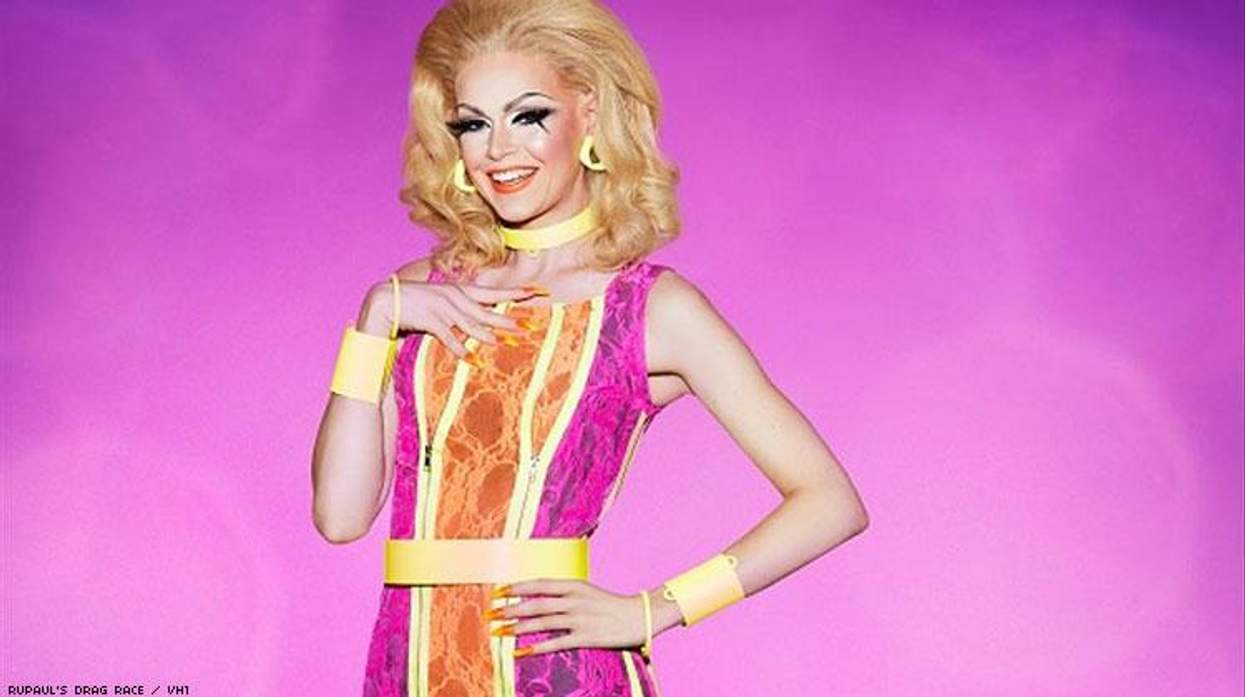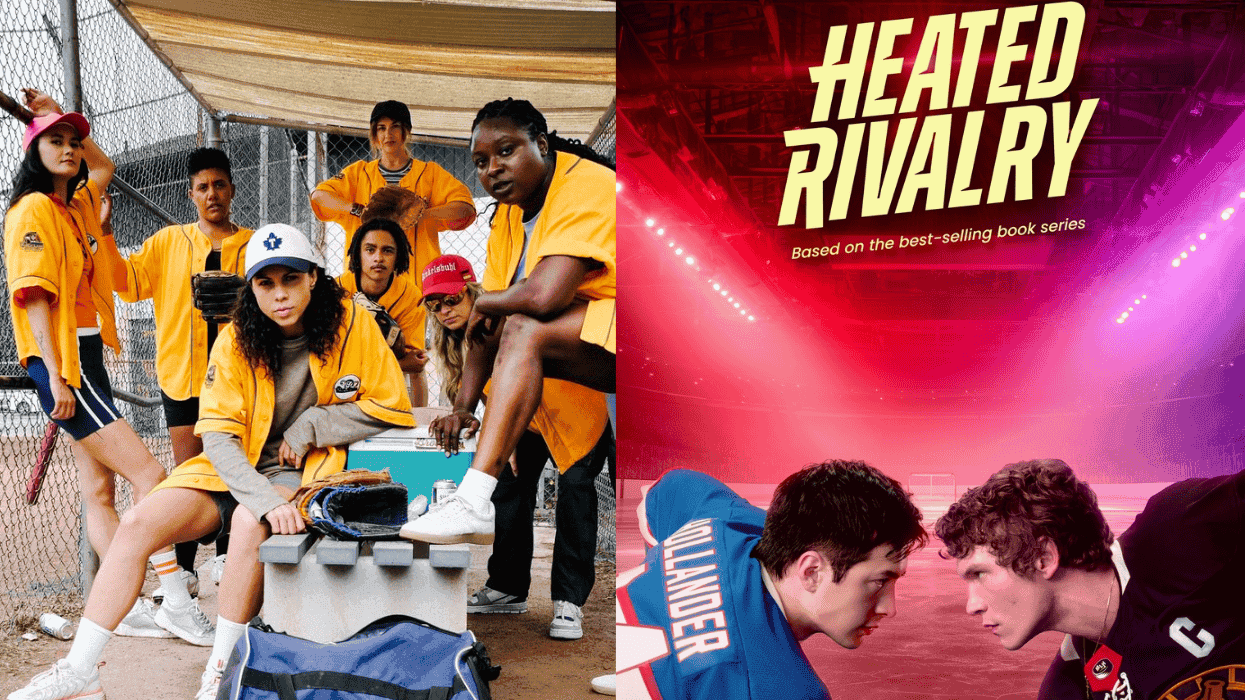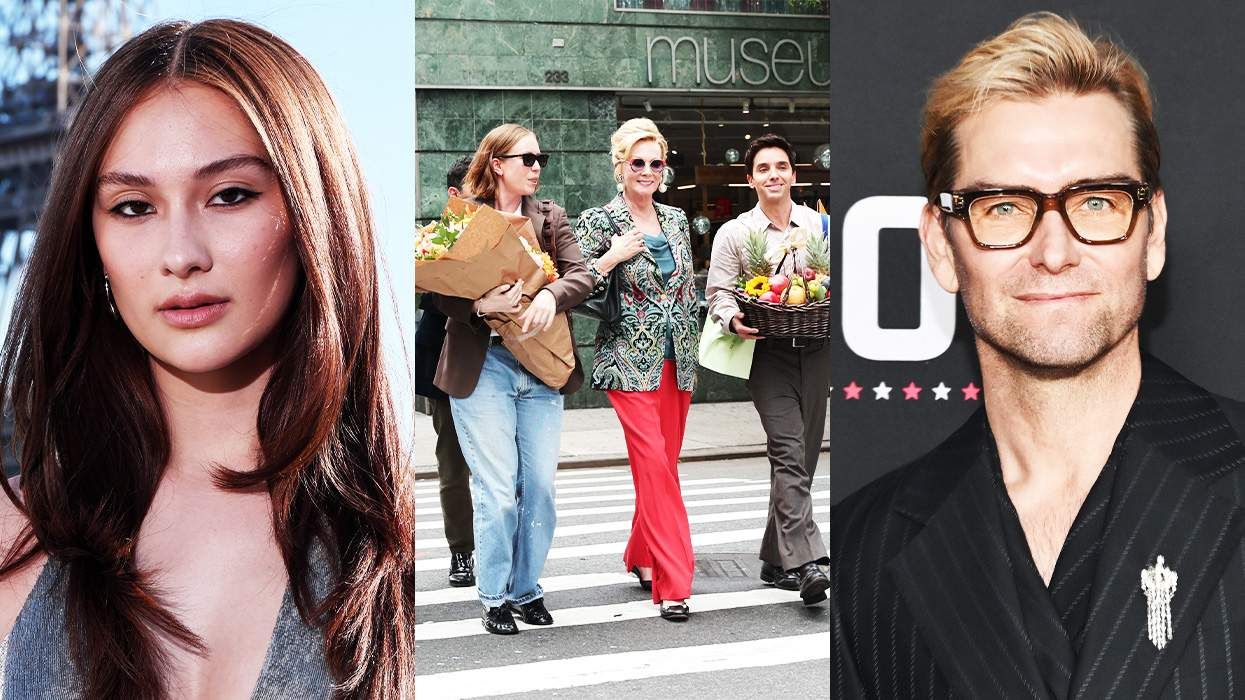Blair St. Clair has broken through new barriers on RuPaul's Drag Race.
The 22-year-old drag performer and Indiana native came out as a survivor of sexual assault on the main stage of the VH1 reality competition last Thursday, after being critiqued as too "sweet" in appearance by the judges.
"I'm urged to find the daintiness, because I feel dirty at times," St. Clair confessed. "My first sexual experience -- I was raped at a college party, and from that I've looked to find pretty things. It's something I need to get over, but I've tried to turn positive the best I can."
In response, RuPaul, echoing the outpouring of love from viewers, declared, "We love you, Blair, we are family, and I'm actually very proud of you for being so vulnerable."
St. Clair sashayed away after speaking her truth -- and sparking a much-needed conversation. The Advocate discussed the emotional moment with St. Clair after her elimination, her journey to recovery, and the #MeToo movement within the gay community.
The Advocate: We're going to miss you from Drag Race, Blair.
Blair St. Clair: Oh, that's so sweet of you to say. I really do appreciate that.
How are you feeling right now? I can't even imagine what the past few days have been like since this episode aired.
I was really dreading this week a lot, and I expressed that to my boyfriend. I was going to Chicago for the viewing party to actually watch [the elimination] on TV in public. And I said, "I'm really, really going to need you by my side." There were a lot of leaks throughout the day that that could be happening. And so that was even harder, walking into the venue on Thursday knowing that half the crowd could have possibly already heard that I'm going home tonight. Watching it on TV was very, very emotional. But after it happened, oddly enough, it was a very weird sense of closure that I did not know that I needed, but definitely needed.
I think for the past six months I've been really processing and feeding my emotions with positivity, and really caring for myself, my emotional state. The one little last thing that I was nervous for is watching myself have to go through some emotions again on TV. And after that's been done, it's surprisingly just been a really beautiful process. There's been such an outpouring of love since then. So it's been much easier to deal with and handle than I anticipated.
And you watched it in front of a crowd of people. What was their reaction like?
I needed a box of tissues. I'll definitely say that. I'm glad that we took pictures beforehand because my makeup was not at its prime afterward. But the whole crowd stood up in a standing ovation and applauded, and it just made me cry even more. Because that moment, I realized that I had the power to change such a negative experience to happen to me into so much love. It was just completely overwhelming -- but this time, a good overwhelming.
Why did you decide that then was the time to talk about your sexual assault, before you left Drag Race?
[Previously] I had never opened up and talked about that at all, because I haven't been able to admit it to myself and actually say some of the words out loud. I think there comes a time where your heart knows that you're ready to talk before your mind truly does. In the moment, I was just vulnerable and open and emotional. I started talking, and I think my heart was really ready before my mind even knew what was happening.
What has it been like to see the rise of the #MeToo movement during these past few months and also knowing that this was going to air?
I was a little nervous but also very excited at the same time, because it's just a movement that's so incredibly powerful and empowering. I think my story, being able to share it in this movement, was just the tip of the iceberg for me in my life. But I was also a little nervous, because there are a lot of people that have very strong opinions in the #MeToo movement. It might be a little too much for some people. I was afraid that my story wasn't going to hit with everybody, and I was afraid that people were going to maybe hold it against me.
Did you experience any backlash?
I try not to read any comments. I try not to keep myself on social media very often. Especially if there's any kind of negative commentary, I don't read it. But from the other people that have been involved in my life, they said, "You know, I haven't seen any negative backlash. I just wanted to remind you how proud I am of you and just continue to stay strong." So from what I've heard is no, I haven't really experienced anything negative.
What was your reaction when Anthony Rapp came out with his story about Kevin Spacey?
My heart breaks every time I hear anything negative or anything bad happen to anyone. Definitely -- I can feel a little bit of that connection. I started to relive some of those negative moments [when I heard Rapp's story]. I think my advice would be that whenever you have some of that negative emotion you're feeling due to anyone else's story, that connection, just to remember how much empowerment you have. It is your choice to feel emotion sometimes. And just because you feel an emotion doesn't necessarily make it always true. I've learned to reprogram my brain, that no matter how negative and how awful I feel sometimes, that there is a way to feel better, and there is a way to get past emotions, because we have to live for the present and future.
I just wonder if Anthony was an inspiration to you, because I feel like there have been such few gay voices in this conversation.
Yes, [I would] definitely say [he was] an inspiration. You need to hear that. I am a drag queen, and I present myself as a female illusion. But behind all the makeup, behind the facade, I am a gay male. Not necessarily just a gay male, but I am a man. Things can happen to anyone, you know? Cases of sexual assault, cases of violence, anything. So I think it's really important that I've had a little bit of a voice in everything as well.
Why do you think there have been so few gay voices? Do you think there are unique obstacles in our community to discussing sexual assault?
Of course. First and foremost, I'm so thankful that Drag Race is becoming so mainstream, because what it's showing me is that drag is allowing femininity to not be looked at as something "less than." For so long in gay culture, femininity means you must be a bottom. It means he must be submissive. It means that you must be less than and have less power. I think Drag Race and drag in general ... has shown that femininity is something to embrace. It is no less than masculinity, and it's your choice to make it and look at it however you perceive. I think that there have been [fewer] voices and [fewer] people speaking out, because I think they've been afraid to look weak and to look less than and to look less powerful. And that's not the case at all.
Have any other survivors reached out to you?
I've had so many people reach out to me and share their story. I just thank them for, first and foremost, being honest with themselves. Thank you for sharing that with me, because I know how deep that is. I know how special that is, and I just continue [to tell] everyone to treat others with respect. Treat yourself, first and foremost, with respect.
At a show this past weekend, I was in tears on the microphone. I told everyone, "Look to your neighbor. Tell them you love them. Look to your neighbor. Tell them you respect them. Look to your neighbor, and tell them that you respect their body." It's now become my turn and my job and my duty to spread a little extra love and spend a little extra empowerment about yourself, your self-worth, and especially keeping your body sacred.
You talked on the show about how your experience influenced your drag, because you wanted to bring that joy and innocence into your performance. Has your journey of recovery impacted the way that you see drag and Blair St. Clair?
I was much more naive [then] than I am today. The person I am today is a much more grown-up, hardened, experienced person than I was six months ago.
I originally created Blair St. Clair without knowing what I was doing. I think what I was really doing was creating an outlet to create more innocence and to create more sweetness in my life, because I felt like I was maybe lacking that. And I was just yearning for more of that. It's been a therapeutic journey for me. I finally allowed myself to open up and become a little bit more susceptible to things that were outside of my comfort zone today.
So Blair has helped you.
Oh, without a doubt. I look at Blair and I as completely different entities. But Blair, she came from me. It's almost as if it's my child, like Blair came from me and I've been able to create and put so much work and effort into this other character that I'm able to be all the time. It is helping me grow. We almost complement each other.
What message would you have for him and for this current administration, which has worked to roll back the rights for not only gay people but survivors of sexual assault?
The world is evolving. The world is changing. And I will allow no one to tell me who I can be, who I can love. And I will not allow [any] one from this day forward to tell me what I can feel and what I cannot feel because of what's happened to me in my life.
I don't think it's appropriate how some people are reaching out and being so negative and fighting fire with fire, because all I'm going to continue to do is fight my battles with love. Truthfully, I need to be able to love myself, to spread as much love as possible. What our nation needs is a little extra love. And what our society and even our culture needs and our world needs is a little bit more positivity, more love, more kindness. It's my job to be able to start with me today.
RuPaul's Drag Race airs Thursdays at 8 p.m. Eastern on VH1. This interview has been edited and condensed.















Charlie Kirk DID say stoning gay people was the 'perfect law' — and these other heinous quotes
These are some of his worst comments about LGBTQ+ people made by Charlie Kirk.